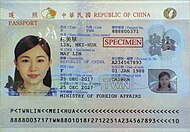| Republic of China (Taiwan) passport 中華民國護照 | |
|---|---|
 A front cover for the current, 2021 version of Republic of China (Taiwan)'s biometric passport | |
 Data page of a second generation biometric passport | |
| Type | Passport |
| Issued by | |
| First issued | 1912 (first version; Beiyang Government) 1929 (booklet) 1945 (in Taiwan) January 1995 (machine-readable passport) 29 December 2008 (first biometric passport) December 2017 (second biometric passport) 11 January 2021 (current version) |
| Purpose | Identification |
| Valid in | All jurisdictions except |
| Eligibility | |
| Expiration | 3–10 years |
| Cost | NT$900–1,300 |
The Republic of China (Taiwan) passport (Chinese: 中華民國護照; pinyin: Zhōnghuá Mínguó hùzhào; Pe̍h-ōe-jī: Tiong-hûa Bîn-kok hō͘-chiàu)[1][2][3][4] is the passport issued to nationals of the Republic of China (ROC, commonly known as Taiwan). The ROC passport is also generally referred to as a Taiwanese passport. In September 2020, approximately 60.87 percent of Taiwanese citizens possessed a valid passport.[5] All passports published in Taiwan since 2008 have been biometric.
The validity and international recognition of Taiwan passport are complicated due to the ongoing dispute over political status of Taiwan as well as the history of the Republic of China since the country had once controlled the territories of today's People's Republic of China (PRC) and Mongolia. In the past, all ethnic Chinese, Mongols, and Taiwanese were subjects to be eligible for the passport. However, constitutional reforms in the 1990s and 2000s greatly reduced the ease by which further grants of nationality were made to overseas Chinese and Mongolian, and restricted citizenship rights only to those with household registration in Taiwan.[6] Taiwanese government currently recognizes that foreign nationals with Taiwanese or Chinese descent must meet certain conditions to be eligible to obtain a passport, but do not have household registration in Taiwan (i.e. they are "nationals without household registration", or "NWOHR"), and thus do not enjoy the right of abode in Taiwan.[a][7] Countries granting visa-free privileges to Taiwan passport holders often require a Taiwanese National ID number imprinted on the passport's biodata page, which signifies the holder's right of abode in Taiwan.
The Republic of China (Taiwan) passport is one of five passports with the most improved rating globally since 2006 in terms of the number of countries that its holders may visit without a visa. As of September 2020, holders of ordinary Republic of China passports (for ROC nationals with Taiwan area household registration who therefore possess right of abode in Taiwan and also the right to obtain a National Identity Card) had visa-free or visa on arrival access to 150 countries and territories, with 20 additional countries granting electronic visas,[5] ranking the Republic of China (Taiwan) passport 32nd in the world in terms of freedom of travel (tied with the Mauritius and St. Vincent and the Grenadines passports), according to the Henley Passport Index 2020.[8][9][10]
- ^ Cheng Hsu-kai (December 2, 2007). "St. Lucia customs woes show utility of new passport". Taipei Times. p. 3. Archived from the original on December 29, 2018. Retrieved September 8, 2008.
- ^ "Taiwanese Passport Move Denounced". China Internet Information Center. June 14, 2003. Archived from the original on 2011-05-20. Retrieved 2008-09-08.
- ^ "Taiwan passport change angers China". BBC News Online. 13 January 2002. Archived from the original on 2019-04-10. Retrieved 2008-09-08.
- ^ "ISECO-Israel Economic and Cultural Office in Taipei". Iseco.org.tw. Archived from the original on 2004-12-31. Retrieved 2008-09-08.
- ^ a b "護照1948年至今改版封面一次看 82年前宋靄齡版本也曝光" (in Chinese (Taiwan)). Central News Agency (Taiwan). 6 September 2020. Archived from the original on 2022-01-15. Retrieved 2022-02-08.
- ^ Roger Mark Selya, Development and Demographic Change in Taiwan (World Scientific, 2004), p. 329.
- ^ Shelley Rigger, "Nationalism versus Citizenship on Taiwan," in Changing Meanings of Citizenship in Modern China, Merle Goldman, Elizabeth Jean Perry ed. (Harvard University Press, 2002), 360-61.
- ^ "Global Ranking - Passport Index 2018" (PDF). Henley & Partners. Archived (PDF) from the original on 29 August 2019. Retrieved 22 May 2018.
- ^ "The Henley & Partners Visa Restrictions Index Celebrates Ten Years" (Press release). Archived from the original on 2016-05-16. Retrieved 2015-09-28.
- ^ "Passport Index" (PDF). Archived (PDF) from the original on 2020-01-08. Retrieved 2020-01-12.
Cite error: There are <ref group=lower-alpha> tags or {{efn}} templates on this page, but the references will not show without a {{reflist|group=lower-alpha}} template or {{notelist}} template (see the help page).